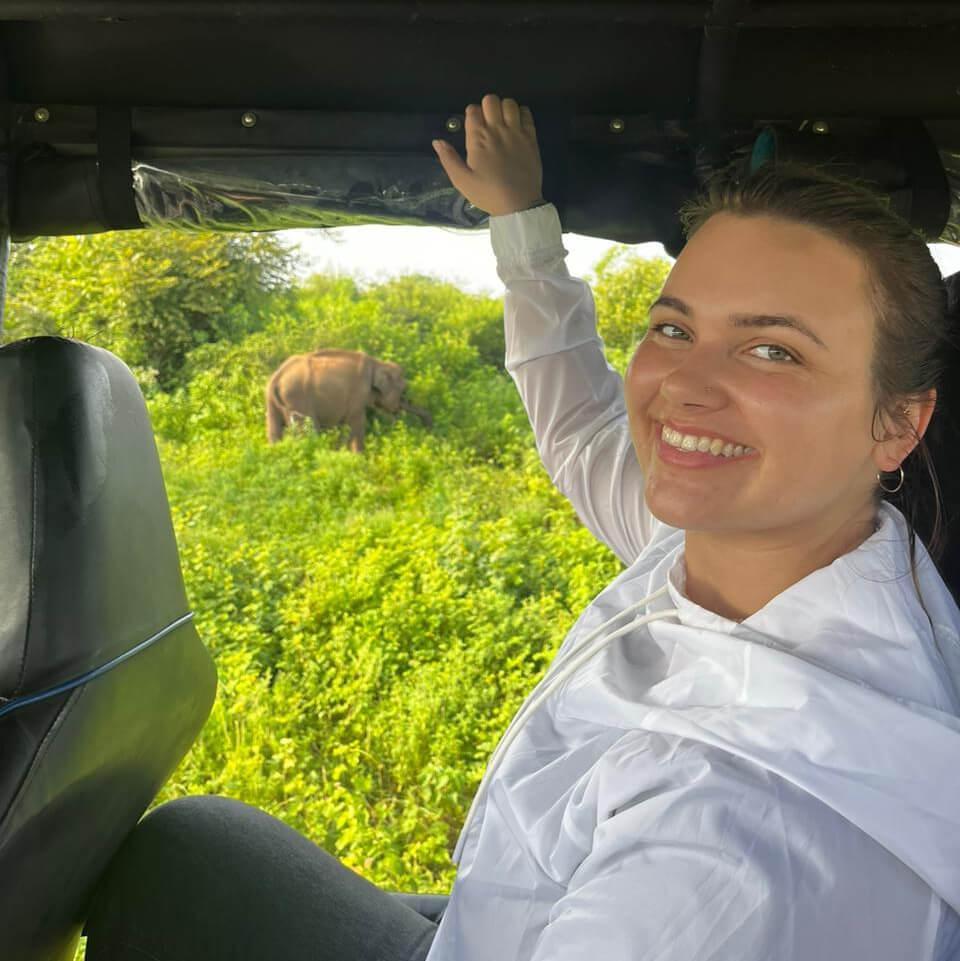Fanning the Flames of Change
Wangari Kuria is Farmer on Fire. Resolute, driven, and steadfast, Wangari has mobilised her local community in Kenya, providing solutions for sustainable agriculture while fighting against gender-based violence.
Wangari Kuria is no stranger to cycles. In life and in nature, there is growth, there is harvest, there is a time to flourish and a time to rest.
Wangari has always been a force of nature; cycles were natural, and she embraced them.
It was a reminder of her girlhood in rural Kenya that changed everything. A few years ago, one of her eight-year-old daughter’s friends didn’t show up for their afternoon playdate. Wangari was shocked to later discover that the girl had been married off in exchange for a dowry.
She would not join future playdates.
Trembling, the girl’s mother told Wangari it was the only option they had, “Most of our cows have died because of the drought. This is the only way we know to survive.”
Eighty per cent of people displaced by climate change are women or girls. Some of the harshest effects of climate displacement are compromised access to clean water and sanitation facilities, as well as severe gender inequalities.
Wangari was accustomed to the harsh realities of agriculture in her country; however, in recent years, things have gotten much worse. Agriculture in Kenya is 98% rainfed and thus extremely vulnerable to increasing temperatures, droughts, and floods. She began to notice farmer after farmer struggling due to their reliance on rainfed pastures for their cows.
Yet, the region had been in a severe drought for several years - their herds were dying.
Back to the Land
Today, Wangari feels it is her calling to address climate-related poverty; but it wasn’t always so.
“Many of my peers left the villages for higher education to escape farming,” Wangari says sadly. “They associated farming with being uneducated and poor and didn’t want that stereotype,” she explains.
“Originally, I wasn’t so different from them.”
Growing up in Nyandarua County, Kenya, Wangari spent her childhood helping out in her mother’s garden. She left the village for university and never planned to return. Following her graduation, she settled into a comfortable life working as a real estate manager in Nairobi until she lost her job in a company-wide layoff. Dejected, Wangari felt she had lost her identity. “I had spent time building myself, making myself in my career, and all of a sudden, it was gone.”
Little did she know, her journey had just begun.


“I moved outside of the city where the cost of living is cheaper,” she says, describing the transition that would bring her back to the land. “I remembered my mother always made sure we didn’t go to bed hungry. This is what inspired me to start a kitchen garden of my own.”
It wasn’t long before Wangari began helping her neighbours with their gardens. Applying her family’s farming knowledge and, after taking agricultural courses, particularly in mushroom farming, she established herself as a respected community farmer.
As Wangari grew within the community, she noticed the harsh effects of climate change on her neighbours' farmland. Despite investments in land preparation, fertilisers, seeds, and labour, farmers' crops failed due to drought, leading to climate-related poverty. In 2017, Wangari realised that the poverty and desperation she witnessed were driven not by the agriculture sector itself but by external climate factors hampering the industry.
“I began to notice painful scenes of poverty daily. Women would come to me and beg for water and food. Many of them were struggling severely in their homes. I could see it in their eyes and hear the sorrow in their voices.”
Wangari speaks with energy and hope, “I wanted to do more; I wanted to provide a refuge. I myself had experienced gender-based violence and wanted to do everything in my power to break this cycle for the women and girls in my community.”
I wanted to do more; I wanted to provide a refuge. I myself had experienced gender-based violence and wanted to do everything in my power to break this cycle for the women and girls in my community.
Breaking the Cycle
Moved by the plights of so many, Wangari decided to bring something radical to her community: education and farming resources for everyone – for free.
“People around me were just thinking of climate change as just a change in the rain cycles. I needed to show people that it was way more than that. I felt a responsibility to provide my village with alternatives and solutions.”
Her number one subject? Mushroom farming. “Mushroom farming changed my life. It is a great way for communities to adapt to climate change and stay resilient.”
Wangari began offering women in her community jobs on her farmland. Eventually, she helped them to set up mushroom farms at home, providing a sustainable income. “They called me the Mushroom Queen,” Wangari laughed. She dreamed of sharing her passion and knowledge with a larger network. “I imagined a place to share, discuss, and learn - a safe space dedicated to transitioning traditional agriculture into a more efficient and productive sector.”
Harnessing her agricultural background, business knowledge, and determination, she grew into a more apt title, Farmer on Fire.
“People thought being passionate, educated, proud, and colourful didn’t fit with being a farmer. I wanted to have a digital platform that shows you can stay true to yourself and work in agriculture.”
And while Wangari really believes that this education can have a massive impact on everyone in the community, she’s aware that it does not appeal to those with more traditional mindsets. “My platform has angered some of the older generation, who prefer traditional education and want to profit from their skills. But Farmer on Fire doesn’t gatekeep. I believe education should be free and accessible for everyone.”
However, Wangari's vision faces resistance, especially from men in her community. “Men feel very responsible for their households and don’t always like women to take the reins financially. My resources are for everyone, but the men in our community haven’t embraced non-traditional farming methods. They think your protein and cash flow should come from cattle,” Wangari explains. “So, for now, I empower women. And this has become my mission in life.”
Through Farmer on Fire, Wangari is determined to help women establish their own sense of financial security.
She believes that support for women in agriculture means total female support. “What I mean is, I support them if they feel they need a place to stay for the night - outside their family home. Through Farmer on Fire, I even set up a partnership to provide women with reusable menstrual products.”
Wangari continues, “These women cry when they receive this support. So many women I work with have daughters. Some even have daughters with disabilities, daughters who face issues as they enter puberty. Nobody talks about how all these crises affect them.”
Lighting Up the Future
Wangari is excited about integrating climate-smart practices into traditional Kenyan farming. She sees insect farming as the future of sustainable agriculture in Kenya, reducing landfill waste and providing sustainable animal feed.
Moreover, Wangari’s emphasis on mushroom farming has been a lifeline for many farmers. This high-income crop is grown indoors, uses less water and land, emits fewer greenhouse gases, and enhances soil health. Additionally, mushrooms offer high nutritional value, serving as a sustainable alternative to traditional animal protein sources.
Drawing on community needs, Wangari is eager to address even the most taboo topics in her rural community. “I see a future where flour fortified with mushroom powder has the ability to address malnutrition and HIV/AIDS challenges in Kenya. No one talks about these things, but the one thing that’s clear is that traditional methods aren’t working.” Wangari’s unflagging energy propels her to the forefront of the climate conversation in Kenya. Her connection to the community and her culture inspires her to continue to innovate, tackling challenges one at a time.
Today, “Farmer on Fire” has over 1.2 million users. The digital platform provides essential information on weather forecasts, pest and disease alerts, market prices, and best farming practices. The platform even helps connect small farmers directly to markets.
“I want to change the perception about farming. It doesn’t need a large investment to start, and with the right tools and knowledge, it can be lucrative - even in the face of climate challenges.”
“Even if you are a woman.”
Her work has changed thousands of lives and continues to inspire a new generation of female farmers to see agriculture not as a last resort but as a vital and dynamic career path.
But Wangari Kurai is not just farming; she is blazing through fields and igniting a community.
Luminous and limitless, Wangari is a farmer on fire.
Most Popular
The Climate Tribe delivers stories about Biodiversity and Conservation, Circular Economy, Food and Water , and how they intersect with climate.
Subscribe
Get the latest stories inspiring climate action around the globe straight to your inbox.





